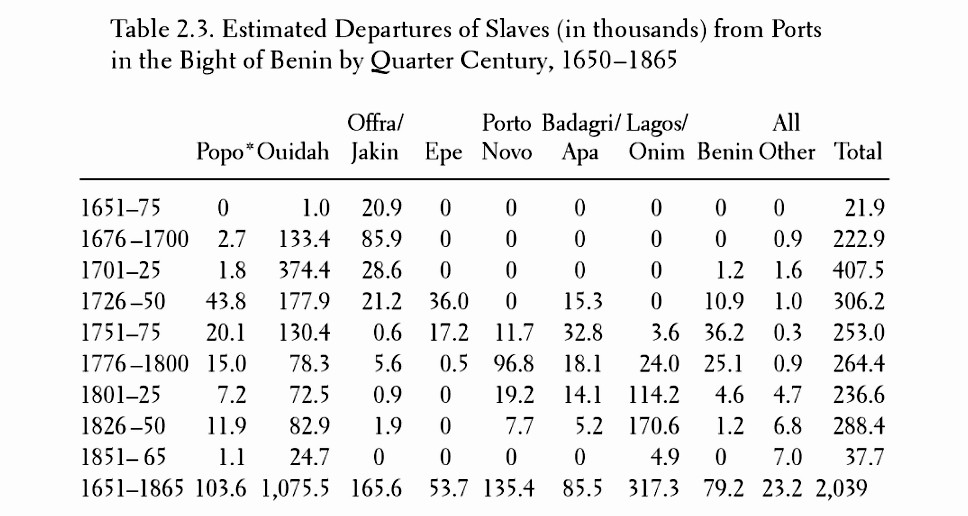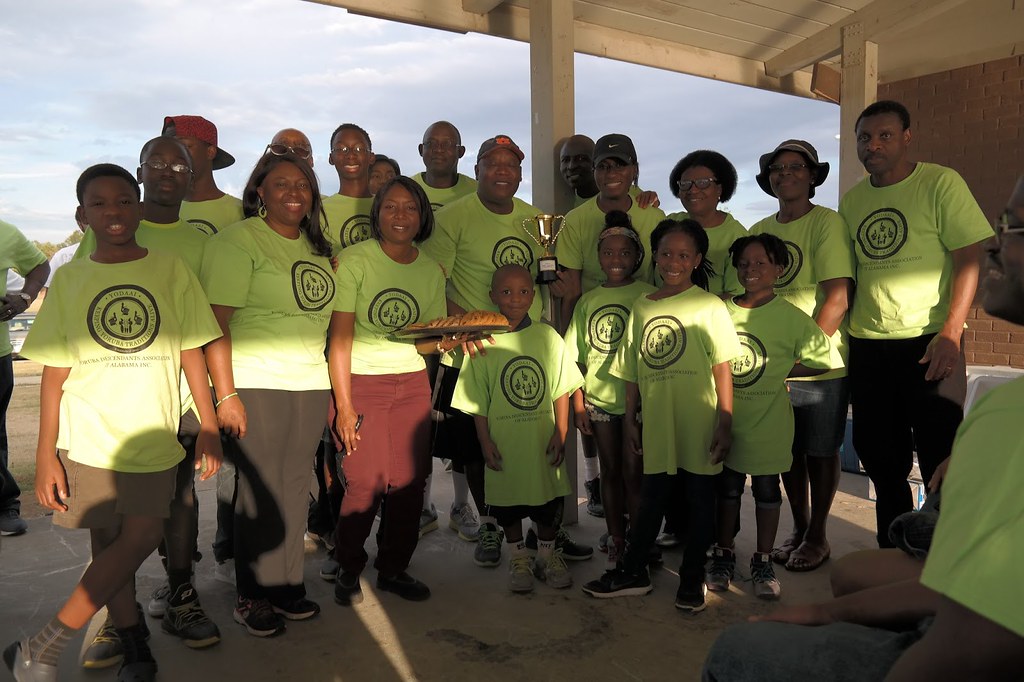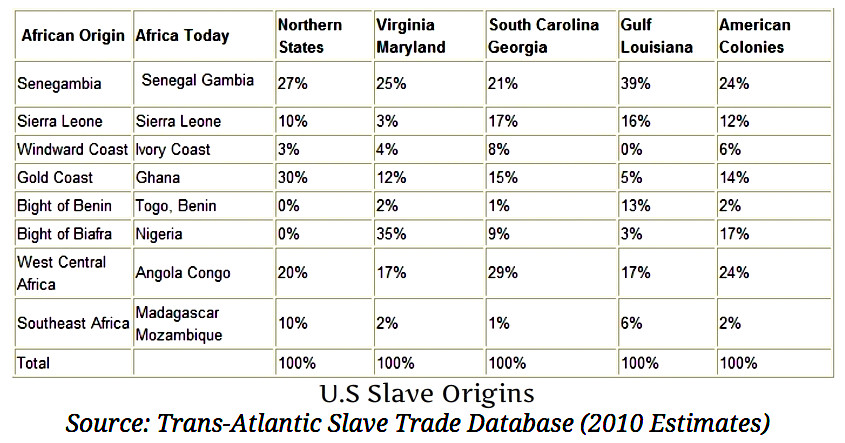Slaves from The Bight of Benin Vs The Bight of Biafra- Numbers & Cultural Legacy - Culture (2) - Nairaland
Nairaland Forum / Nairaland / General / Culture / Slaves from The Bight of Benin Vs The Bight of Biafra- Numbers & Cultural Legacy (42417 Views)
Are Yoruba Changing Bight Of Benin To Bight Of Oyo? Or Was It Truly Bight Of Oyo / How The bight Of Benin Was Named After The Benin Empire / Comparing Slave Numbers from Bight of Benin and Bight of Biafra from 1400 - 1865 (2) (3) (4)
(1) (2) (3) (4) (5) (6) (7) (8) (9) (Reply) (Go Down)
| Re: Slaves from The Bight of Benin Vs The Bight of Biafra- Numbers & Cultural Legacy by YourNemesis: 11:59pm On Jan 19, 2017 |
Between 1650 and 1865, 2.4 Million slaves were estimated to have left / embarked from the bight of Benin coast - And approximately 1.67 Million of them were estimated to have belonged to Yoruba cultures.   1 Like |
| Re: Slaves from The Bight of Benin Vs The Bight of Biafra- Numbers & Cultural Legacy by bigfrancis21: 12:02am On Jan 20, 2017 |
RockHard: Listen up, the Congolese, Angolans, Akan may have even been more in numbers than Igbo slaves and all these groups with major numbers had very little bits of culture that survived. It is not an Igbo thing, it is a matter of when you arrived or the period in time when the tribes arrived. Compare the figures exported from Bight of Biafra and Bight of Benin. Exports from Biafra was consistent from the beginning of slavery (1400), and dropping towards the end, while exports from Benin (Lagos and Badagri ports) did not pick up until half-way into the slave trade era (1751) and rose towards the end (when Lagos sent its most slaves). So once again, it was as a result of the time when Yoruba slaves arrived the new world. Figures show that Yoruba slaves were the last to arrive the new world, and for them their origins were still fresh in mind and they taught other slaves about mama africa and their roots! Remember, not all Ifa practitioners in the diaspora are of Yoruba ancestry! [img]https://tracingafricanroots.files./2015/06/chambers-2002-table1-estimated-percentage-of-igbo-captives1.jpg?w=869[/img] 1 Like
|
| Re: Slaves from The Bight of Benin Vs The Bight of Biafra- Numbers & Cultural Legacy by pazienza(m): 12:04am On Jan 20, 2017 |
RockHard: Lol! Delusions, even when presented with superior argument. 3 Likes |
| Re: Slaves from The Bight of Benin Vs The Bight of Biafra- Numbers & Cultural Legacy by bigfrancis21: 12:11am On Jan 20, 2017 |
YourNemesis: Untrue. “Abstract: Rice production was a key industry of many colonial South Carolina low country plantations. Accordingly, rice plantations owners within South Carolina often requested enslaved Africans from the so-called ‘‘Grain Coast’’ of western Africa (Senegal to Sierra Leone). Studies on the African origins of the enslaved within other regions of the Americas have been limited. To address the issue of origins of people of African descent within the Americas and understand more about the genetic heterogeneity present within Africa and the African Diaspora, we typed Y chromosome specific markers in 1,319 men consisting of 508 west and central Africans (from 12 populations), 188 Caribbeans (from 2 islands), 532 African Americans (AAs from Washington, DC and Columbia, SC), and 91 European Americans. Principal component and admixture analyses provide support for significant Grain Coast ancestry among African American men in South Carolina. AA men from DC and the Caribbean showed a closer affinity to populations from the Bight of Biafra.“ https://tracingafricanroots./2015/05/28/locating-african-american-haplogroups-within-africa/ DNA is never lost!  2 Likes 1 Share |
| Re: Slaves from The Bight of Benin Vs The Bight of Biafra- Numbers & Cultural Legacy by RockHard: 12:19am On Jan 20, 2017 |
bigfrancis21: Dude, i'm not one to engage you in a fruitless back and forth banter over a non-issue. I already spelled out my premise and didn't even argue or disagree with you concerning the numerical strength of igbos slaves relative to others. No. I am merely stating the obvious fact that the Yoruba culture has, more than any other I can think of, managed to stay alive, endure and even convert more adherents that would rather identify with it than any other amongst the descendants of slaves in the diaspora. There's a higher probabilty that more of the descendants of those slaves would be quicker to identify with Yoruba culture than igbo today, #Fact. And your comment that "not all Ifa practitioners in the diaspora are of Yoruba ancestry" only goes further to buttress this point. Look i can't shout, abeg. 5 Likes 1 Share |
| Re: Slaves from The Bight of Benin Vs The Bight of Biafra- Numbers & Cultural Legacy by YourNemesis: 12:19am On Jan 20, 2017 |
The Population of Yoruba slaves in Bahia alone is more that the number of Igbo slaves in All the US. loL Mind You, in the New World, the Yorubas Multiplied much more than their Igbo counterparts And while Igbo slaves were quite numerous in the New world, a lot of them ended up in small caribbean countries with 0 cultural impact. Ghana/Akan have become the Face of Jamaica Yoruba has become the face of Brazil, Venezuela, Mexico, Cuba, Puerto Rico, Brazil Etc and increasingly so in the US. Fons (And Yoruba to a lesser extent) has become the face of Haiti. I believe that will be the future. Forget that ur DNA ish, It don't even matter to Pan-Africanists. People that consider All Black people one family aren't going to start checking if the majority of their DNA is Mali or Congo before connecting back to Africa. They would just look for the most prominent culture around them. 5 Likes |
| Re: Slaves from The Bight of Benin Vs The Bight of Biafra- Numbers & Cultural Legacy by YourNemesis: 12:30am On Jan 20, 2017 |
BugFrancis Yoruba Descendant association of Alabama. [img]http://3.bp..com/-nnkswukGUOg/UAopr05DClI/AAAAAAAAA3A/OHAABG-0K9Q/s1600/logo.gif[/img] Mind You, Might of Benin descandants Outnumbered Bight of Biafra folks in the US Gulf coast.   6 Likes 1 Share |
| Re: Slaves from The Bight of Benin Vs The Bight of Biafra- Numbers & Cultural Legacy by laudate: 12:34am On Jan 20, 2017 |
bigfrancis21: Re-ea-ally??!  I was called all kinds of nasty epithets a few years back, when I told some chaps on that thread that a naming ceremony is part of Igbo culture. I was called all kinds of nasty epithets a few years back, when I told some chaps on that thread that a naming ceremony is part of Igbo culture.Here is one of the responses made on that thread: Donzman: 4 Likes 1 Share |
| Re: Slaves from The Bight of Benin Vs The Bight of Biafra- Numbers & Cultural Legacy by bigfrancis21: 1:23am On Jan 20, 2017 |
RockHard: @bold... I've always agreed. Never disputed that. My point made is that not all these adherents are necessarily of Yoruba descent. You and I, as we know, are highly westernized and practice Western culture, food, dressing, religion (Christianity etc.) but we are NOT Europeans neither are we Westerners. That is just my point. |
| Re: Slaves from The Bight of Benin Vs The Bight of Biafra- Numbers & Cultural Legacy by bigfrancis21: 1:23am On Jan 20, 2017 |
cc probz |
| Re: Slaves from The Bight of Benin Vs The Bight of Biafra- Numbers & Cultural Legacy by bigfrancis21: 1:26am On Jan 20, 2017 |
Some Igbo Cultural Remnants in the New World Carabali Isuama and Carabali Elugu (Surviving calbidos or groups in Cuba of Isuama and Elugu Igbo descent. Carabalí Isuama/Isuamo were Africans who likely came through the port of Calabar from the Isuama region now in Imo State and Rivers State, Nigeria) https://www.youtube.com/watch?v=waYt62amopw https://www.youtube.com/watch?v=m34Ux2PvhLo
|
| Re: Slaves from The Bight of Benin Vs The Bight of Biafra- Numbers & Cultural Legacy by bigfrancis21: 1:34am On Jan 20, 2017 |
Ibo Lele Traditional Music by Haitians in Recognition of their Igbo Ancestors https://www.youtube.com/watch?v=r9ADfEyh7PQ
|
| Re: Slaves from The Bight of Benin Vs The Bight of Biafra- Numbers & Cultural Legacy by bigfrancis21: 1:41am On Jan 20, 2017 |
Igbo Drum/Song in Cariaccou An Igbo song follows. “Ovid-o Bagade,” a social metaphor, tells of the fear faced by a paranoid farmer, Ovid, who plants and yields unexpected evil. “Bagarde, Don’t be afraid,” sings the chorus. Ovid-o Bagadé [Igbo] Mwen planté shu mwen Li turné ba legé Ovid-o bagardé, bagardé éh-hé Mwen planté shu mwen Li turné maljo-jo (melangen, balissé) Ovid-o bagardé, bagardé éh-hé [Translation] I plant tanya And it turns to nothing Ovid, don’t be afraid, don’t be afraid. I plant tanya And it turns to fear (eggplant, bush) Ovid don’t be afraid, don’t be afraid. http://webcache.googleusercontent.com/search?q=cache:http://www.lameca.org/dossiers/bigdrum/musiq_eng.html |
| Re: Slaves from The Bight of Benin Vs The Bight of Biafra- Numbers & Cultural Legacy by bigfrancis21: 2:01am On Jan 20, 2017 |
YourNemesis: Statistically, this is not the case unfortunately/ |
| Re: Slaves from The Bight of Benin Vs The Bight of Biafra- Numbers & Cultural Legacy by YourNemesis: 2:42am On Jan 20, 2017 |
bigfrancis21: Well, if that is the case, then the Senegambian tribes, most especially Atlantid tribes like Wolof and Mandes, as well as Angola-Congo tribes such as the Kongos and Mbundus would take the rice for the US. Not Igbo. Infact THREE African slave regions outnumber the Bight of Biafra in the USA (Akan area, Senegambia/Mande Area AND Kongo Area). Maybe even 4, With Sierra Leone being the Fourth. The Igbo impute in the US is very much overrated. But do these tribes get most of the cultural recognition? NOPE. Cos from Data, the only place where Bight of Biafra outnumber any of the Three groups is the Virginia region (Which is already well known) Hence why that Igbo village was situated there.  Moreso, The US received one of the smallest imputes of slaves in the new World. The Bulk went to places like Brazil and Haiti. Trust me when I say all these things you are talking about don't mean Ish. People will always identify with Interesting and richer cultures. 6 Likes 1 Share |
| Re: Slaves from The Bight of Benin Vs The Bight of Biafra- Numbers & Cultural Legacy by pazienza(m): 8:32am On Jan 20, 2017 |
No. I am merely stating the obvious fact that the Yoruba culture has, more than any other I can think of, managed to stay alive, endure and even convert more adherents that would rather identify with it than any other amongst the descendants of slaves in the diaspora. There's a higher probabilty that more of the descendants of those slaves would be quicker to identify with Yoruba culture than igbo today, #Fact. "The survival of Yoruba traditional elements is attributed to 2 major reasons: the late emergence of Yoruba slaves in the slave trade and favorable slave conditions and weakened slave laws in Latin American slave colonies in the mid/late 19th century". #Fact 3 Likes |
| Re: Slaves from The Bight of Benin Vs The Bight of Biafra- Numbers & Cultural Legacy by Lushore1: 9:03pm On Jan 20, 2017 |
pazienza: Let assume you are right that yoruba slaves were late in the game. Can you tell me why is this? Since yorubas have early contact with white men than igbo.... 2 Likes |
| Re: Slaves from The Bight of Benin Vs The Bight of Biafra- Numbers & Cultural Legacy by Lushore1: 10:04pm On Jan 20, 2017 |
If order of arrival would explain the lasting cultural footprint then Fulani should be the culture surviving and not Yoruba. 3 Likes |
| Re: Slaves from The Bight of Benin Vs The Bight of Biafra- Numbers & Cultural Legacy by Lushore1: 10:06pm On Jan 20, 2017 |
^^^I don't think it has anything to do with that... The last slaves to land on the shores of USA were part of the Igbo landing in Virginia, however that never changed anything there... 4 Likes 1 Share |
| Re: Slaves from The Bight of Benin Vs The Bight of Biafra- Numbers & Cultural Legacy by YourNemesis: 10:09pm On Jan 20, 2017 |
Lushore1: lol.... You dey mind them? They are just repeating the same things said by some New World researchers, nothing that was being thought about by themselves. They should tell us how the Fons managed to preserve Vodun in Louisiana despite their very old presence there. Or how the Yoruba and Fon slaves of Haiti managed to Preserve their culture, while that of the Igbos on the same Island died out.  We are all waiting patiently. 5 Likes 1 Share |
| Re: Slaves from The Bight of Benin Vs The Bight of Biafra- Numbers & Cultural Legacy by YourNemesis: 10:25pm On Jan 20, 2017 |
ODUNDE FESTIVAL, USA Officially recognized on the USA Public holidays calendar.     3 Likes 1 Share |
| Re: Slaves from The Bight of Benin Vs The Bight of Biafra- Numbers & Cultural Legacy by pazienza(m): 10:57pm On Jan 20, 2017 |
Lushore1: Your question is irrelevant to the scope of this thread. 1 Like |
| Re: Slaves from The Bight of Benin Vs The Bight of Biafra- Numbers & Cultural Legacy by pazienza(m): 10:59pm On Jan 20, 2017 |
Lushore1: Why should t it be Fulani, rather than Yorubas. Can you use a credible data to show us the number Of Fulanis exported to the New world, as compared to Yorubas? 1 Like |
| Re: Slaves from The Bight of Benin Vs The Bight of Biafra- Numbers & Cultural Legacy by pazienza(m): 11:01pm On Jan 20, 2017 |
YourNemesis: I believe Bigfrancis21 had posted many U tube video links of surviving Ibo heritage and culture in the New world. Why do you choose to continue exhibiting your fantasies here? 3 Likes |
| Re: Slaves from The Bight of Benin Vs The Bight of Biafra- Numbers & Cultural Legacy by Lushore1: 2:08am On Jan 21, 2017 |
pazienza: So you don't know fulanis are one of the last group of slaves in the new world?...please use Google it's free. 2 Likes |
| Re: Slaves from The Bight of Benin Vs The Bight of Biafra- Numbers & Cultural Legacy by pazienza(m): 11:42am On Jan 21, 2017 |
Lushore1: It's not just about the period of arrival, but also the numbers. Yorubas had the numbers, Fulanis didn't,how hard is this to understand? |
| Re: Slaves from The Bight of Benin Vs The Bight of Biafra- Numbers & Cultural Legacy by Lushore1: 1:16pm On Jan 21, 2017 |
pazienza: I thought your brother was just telling us in another thread that only 300-400 thousand yoruba slaves left the sores of Africa. bigfrancis21: |
| Re: Slaves from The Bight of Benin Vs The Bight of Biafra- Numbers & Cultural Legacy by laudate: 1:22pm On Jan 21, 2017 |
bigfrancis21: Are all the adherents of the Carabali Isuama and participants of the Carabali Olugo, necessarily of Igbo descent? Just asking.  4 Likes |
| Re: Slaves from The Bight of Benin Vs The Bight of Biafra- Numbers & Cultural Legacy by Lushore1: 1:25pm On Jan 21, 2017 |
pazienza: bigfrancis21: You can't have it both ways, especially if we have to believe your brother arguement. Igbo with 1.2 million slaves simply have minimal impact in the new world in comparison to the half a million yoruba slaves. |
| Re: Slaves from The Bight of Benin Vs The Bight of Biafra- Numbers & Cultural Legacy by pazienza(m): 3:16pm On Jan 21, 2017 |
Lushore1: You are comparing apples with oranges here. The Post you quoted was talking about Igbo and Yoruba, not Yoruba and Fulani. Fulani slave exports were too negligible to make any form of impact, considering that they arrived almost same time with the Yorubas who outnumbered them by many times. 5 Likes |
| Re: Slaves from The Bight of Benin Vs The Bight of Biafra- Numbers & Cultural Legacy by pazienza(m): 3:19pm On Jan 21, 2017 |
laudate: Carabali Isuama and Carabali Elugu, are not religious practices to be adhered to. They are names of Igbo groups, Isuama and Elugu, who were shipped out via the Carabali slave markets at the Bight of Biafra. 4 Likes |
| Re: Slaves from The Bight of Benin Vs The Bight of Biafra- Numbers & Cultural Legacy by pazienza(m): 3:21pm On Jan 21, 2017 |
Lushore1: Yes, and that number is quite substantial when placed beside the factors on ground in the New world, during their arrival. 3 Likes |
(1) (2) (3) (4) (5) (6) (7) (8) (9) (Reply)
King Nwachukwu Nashid Koleoso Karade Eri, Undergoing Spiritual Cleansing. Photos / 8 Reasons Why You Meet Few Hausa/Fulanis In The Uk / Masquerade Climbing Electric Pole In Kogi (Photos)
(Go Up)
| Sections: politics (1) business autos (1) jobs (1) career education (1) romance computers phones travel sports fashion health religion celebs tv-movies music-radio literature webmasters programming techmarket Links: (1) (2) (3) (4) (5) (6) (7) (8) (9) (10) Nairaland - Copyright © 2005 - 2024 Oluwaseun Osewa. All rights reserved. See How To Advertise. 91 |